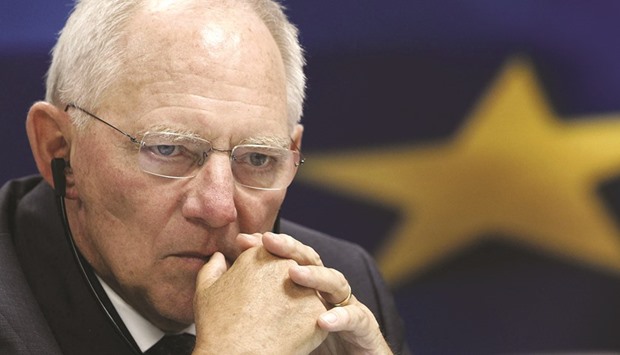German Finance Minister Wolfgang Schaeuble stepped up Berlin’s criticism of Ankara yesterday after Turkey’s chief diplomat drew on Germany’s Nazi past to again attack the country.
Schaeuble said Berlin viewed political developments in Ankara with “considerable concern” after Turkish President Recep Tayyip Erdogan compared the cancellation of rallies across Germany for next month’s referendum on constitutional reform in Turkey to “Nazi practices”.
Echoing comments on Monday by Chancellor Angela Merkel, Schaeuble told foreign correspondents in Berlin that Erdogan’s remarks were “unacceptable” and “irresponsible”.
“It would be wise if President Erdogan quickly found a way to make this go away,” Schaeuble said. “We can’t accept that Germany is being talked about in such a way.”
But in an interview with the Turkish daily Hurriyet, Foreign Minister Mevlut Cavusoglu hit out again at Germany.
“That is a totally repressive system,” Turkey’s chief diplomat said, repeating Erdogan’s claims that the cancellation of rallies by Turkish ministers in Germany as “reminiscent of the Nazi era”.
He criticised Germany and other European countries including the Netherlands, where politicians including Prime Minister Mark Rutte have condemned Cavusoglu’s plans to attend a similar rally in Rotterdam.
“We are in a state of great fear,” Cavusoglu said. “If we cannot stop the advance of racist parties, Europe will head (back) to the pre-World War II period.”
As tensions between the two nations escalated, Turkey’s Minister for Economic Affairs Nihat Zeybekci said he was launching legal action against Germany’s daily Bild after the newspaper referred to him as Erdogan’s “loyal attack dog”.
Zeybekci described the Bild report as “primitive insults” directed against the whole of Turkey.
“We cannot accept this outrageous attack,” he said.
Bild’s publisher, the Springer Group, said only that any legal action against the newspaper would be examined.
Turkish EU Affairs Minister Omer Celik spoke yesterday with Michael Roth, state secretary at Germany’s foreign ministry, sources in Celik’s ministry said.
“Turkish-German relations are not local authorities’ responsibility but that of the German state,” Celik told Roth, according to the sources. “We believe this is a systematic obstacle to our government.”
Cavusoglu said yesterday that he would go ahead with a planned visit to Germany despite local authorities’ banning him from making a speech on safety grounds.
“I am going to Hamburg today,” Cavusoglu told foreign countries’ chief consuls, including Germany’s, in Istanbul. “I will meet this evening with our citizens in Hamburg.”
He added: “Nobody can and should prevent us from meeting with our citizens.”
Local authorities in Germany had called off a rally in the northern city of Hamburg where Cavusoglu was due to speak, citing fire safety concerns.
But the Turkish foreign ministry told AFP that a new venue had been found, and Hamburg police confirmed Cavusoglu would meet 150 people from the Turkish community at the residence of the consul general.
A demonstration calling for a “No” vote in the referendum has meanwhile been planned nearby.
Cavusoglu said he would meet his German counterpart Sigmar Gabriel, whom he called a “friend”, at a breakfast in Berlin today and visit a tourism fair.
Diplomatic relations between Turkey and Germany have taken a turn for the worse over the last week after the cancellation of the rallies aimed mobilising support for the April referendum among the 1.4mn Turkish voters living in Germany.
Cavusoglu also claimed in the interview that Germany was applying pressure to get a “no” vote in the referendum, which if approved would vastly expand Erdogan’s powers and weaken parliament.
The foreign minister is a member of Erdogan’s Justice and Development Party (AKP).

Schaeuble: We can’t accept that Germany is being talked about in such a way.
